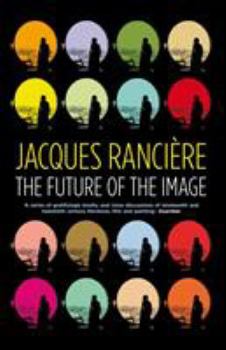The Future of the Image
Select Format
Select Condition 
Book Overview
A major philosopher presents a fascinating treatise on the radical future of art and film. In The Future of the Image, Jacques Ranciere develops a fascinating new concept of the image in contemporary... This description may be from another edition of this product.
Format:Paperback
Language:English
ISBN:1844672972
ISBN13:9781844672974
Release Date:February 2009
Publisher:Verso
Length:147 Pages
Weight:0.54 lbs.
Dimensions:0.6" x 5.0" x 7.5"
Customer Reviews
1 rating
The emancipatory potential of art
Published by Thriftbooks.com User , 18 years ago
"The Future of the Image" by Jacques Ranciere offers an unique critique and perspective on contemporary art forms ranging from film to painting, photography and theater. As an Emeritus Professor of Philosophy at the University of Paris, Mr. Ranciere approaches the subject matter not as an art historian but as an intellectual who is interested in exploring the importance of art in society. This fascinating book succeeds in presenting a sophisticated analysis of the image that can help artists and audiences better appreciate the emancipatory potential of art. Mr. Ranciere reminds us that the autonomy of art was first asserted in the 1760s when highly representational art forms that were based on a shared cultural history were beginning to be abandoned. Mr. Ranciere explains that modern art represents a neo-Platonic discourse that derives its meaning from the interaction between the image and the audience. For example, the canvas is merely a surface upon which the painter's ideals are expressed and communicated to viewers. Mr. Ranciere contends that whether the artist produces figurative representations or abstract symbols, their forms are always endowed with meaning; indeed, art remains art insofar as the image stimulates interpretation. In this manner, the author questions the popular notion that 20th century artists merely strove to emphasize the flatness of the medium for its own sake, and challenges us to look at art anew. Mr. Ranciere contends that modern art can achieve sublimity through varied techniques such as juxtaposition and narration. In particular, Mr. Ranciere believes that the early film noir classic 'The Spiral Staircase' and its depiction of the stalking of a vulnerable invalid is successful in that it symbolically conveys the film maker's horror about the clinical extermination of the weak in Nazi Germany. In such films, Mr. Ranciere sees a dialectical process at work where art helps to humanize us by writing a history that opposes violence and power. I highly recommend this challenging but highly rewarding book to demanding readers who may be interested in the meaning of contemporary art.





